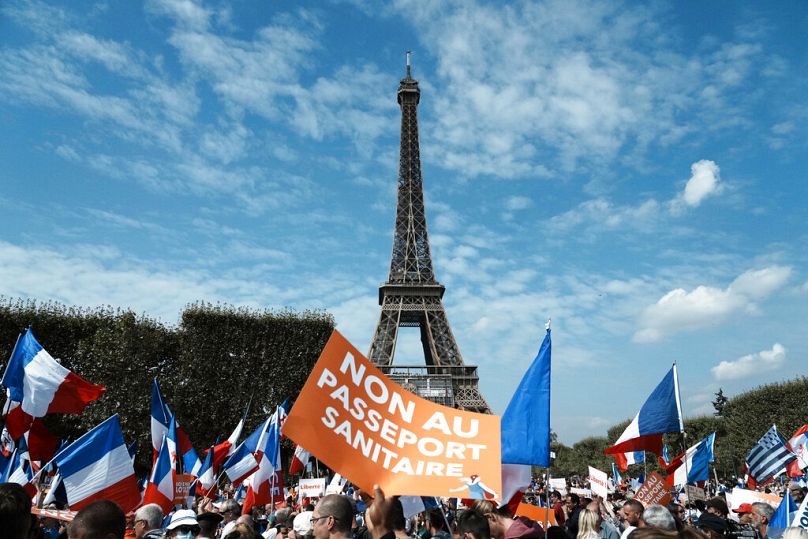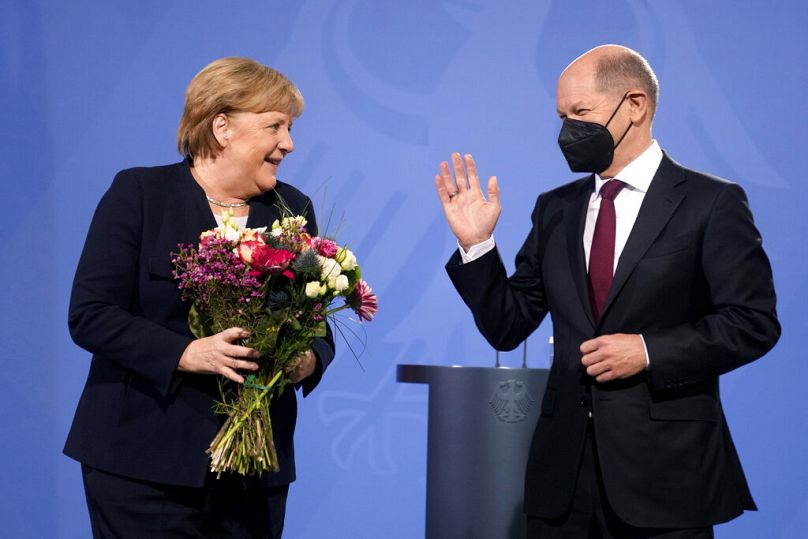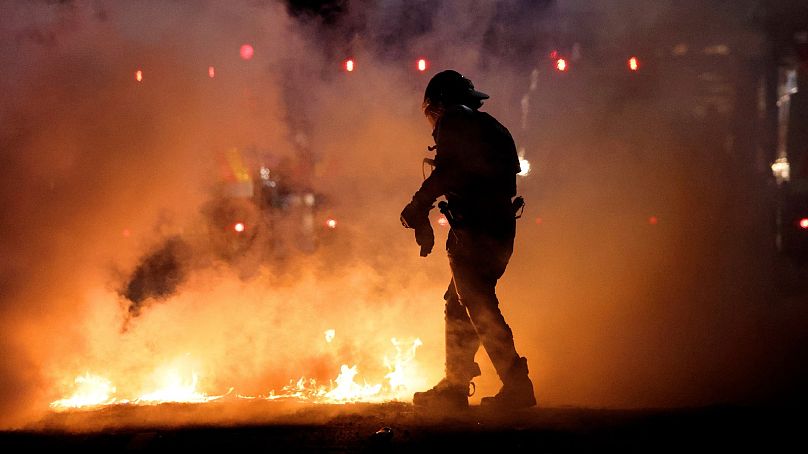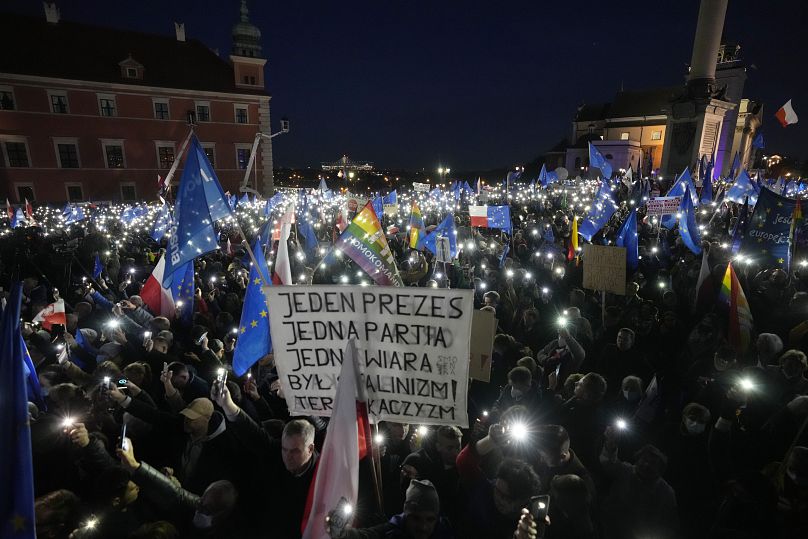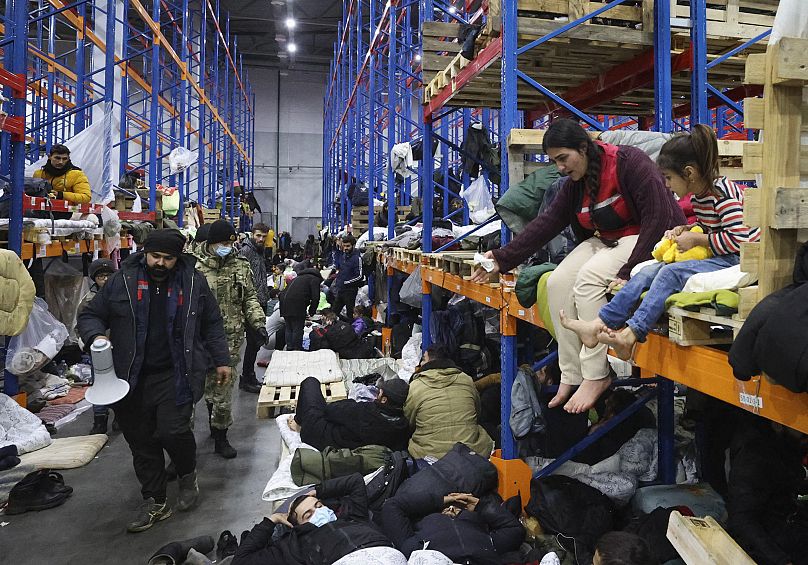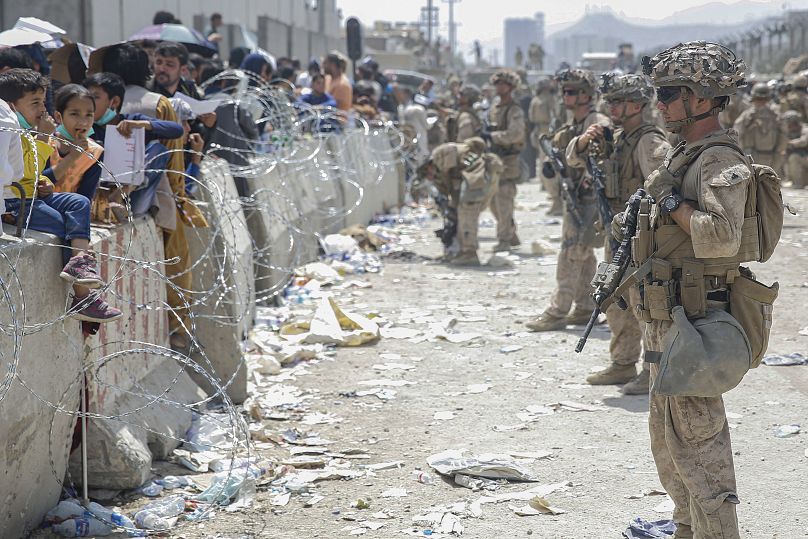From COVID to Brexit and Kyiv to Berlin, here are the stories that helped shape Europe's 2021.
1. The EU's COVID vaccination campaign had a difficult start
The rollout of COVID vaccines in the EU began controversially.
It started in January with criticism over the slowness of the bloc's vaccination campaign, which was plagued by shortages and other hurdles.
By late March, three months into the campaign, about 5% of the EU's 450 million residents had been fully vaccinated against COVID compared to 6 % in the UK and 19% in the US.
The bloc's members adopted a coordinated approach at the EU level for the purchase of doses, with each country receiving doses proportionally to its population.
But Brussels openly clashed with vaccine manufacturer AstraZeneca after the company said its first-quarter promises of 80 million doses would in reality amount to fewer than half that figure because of what the company referred to as technical issues.
A controversial export control system was put in place in March when a shipment of more than a quarter-million AstraZeneca vaccines destined for Australia was blocked from leaving.
The AstraZeneca distribution suffered another setback when many European countries decided to stop using the vaccine in order to investigate very rare cases of blood clots.
The European Medicines Agency later found a "possible link" between the AstraZeneca product and the medical condition but insisted that benefits from using the vaccine continued to outweigh risks.
While most EU countries gradually resumed the administration of the AstraZeneca shot, new age limitations and a litany of unfavourable headlines inevitably damaged the vaccine's reputation across the continent.
After months of disputes, the EU and AstraZeneca said in September that they reached a deal to end their legal battle over the slow pace of deliveries of the company’s COVID-19 vaccines.
Eventually, the EU's vaccination campaign picked up pace relying more heavily on Pfizer and Moderna's jabs.
According to Our World in Data, an estimated 68.5% of the EU's total population was fully vaccinated as of 18 December, compared to 60.9% for the United States and 68.9% in the UK.
2. Moves to push Europe's unvaccinated to get the jab have proved controversial
But just as Europe's vaccination campaign picked up pace, a new controversy emerged. How to encourage the unvaccinated to get the jab.
For a long time, Italy appeared to be the outlier after making the vaccination of health workers compulsory in March.
But the fast-spreading Delta variant forced many European states to change gears.
In July, France and Greece followed Italy's lead.
Several countries then introduced health passes, which only allow those with the vaccine -- or in some cases, a negative PCR test or proof that the individual had recovered from the disease -- to access restaurants, bars and entertainment venues.
Although the modalities differ from country to country, the pass is now implemented in several European countries including Austria, Belgium, Cyprus, France, Germany, Greece, Hungary, Ireland, Italy, Luxembourg, the Netherlands, Portugal and Slovenia.
They sparked large protests across Europe, with demonstrators denouncing what they see as oppressive rules.
Under the pressure of a new rise in infections in the autumn, the debate in Europe has now shifted from health passes to mandatory vaccination.
From February 1, vaccination will be mandatory in Austria, the first compulsory vaccination requirement in Europe.
Meanwhile, German MPs are expected to vote on making vaccination mandatory in early 2022.
3. Germany's pivotal election saw the end of Merkel's long stint in power
This past year was not all about COVID-19, however.
Another defining moment was the German election on September 26, which marked the end of Angela Merkel's 16-year stint as chancellor.
A former scientist who grew up in communist East Germany, Merkel outlived four US presidents, four French presidents, five British prime ministers, and eight Italian premiers.
During her near-record tenure, the country's first female chancellor was credited with handling a series of crises, defending Western values in turbulent times, and being a role model for women.
Merkel's successor Olaf Scholz took his oath on December 8 after his centre-left Social-Democratic party of Germany (SPD) and its coalition partners, the Free Democrats and the Greens, secured 416 seats in the 736 lower house of the German parliament.
Scholz, who served as Merkel's finance minister, seems poised to embrace a vast part of her legacy both in style and substance.
But his coalition government has vowed more progressive policies on societal and environmental issues and a firmer approach towards authoritarian regimes on the international stage.
4. Brexit finally took effect but it's been a bumpy road
The effects of the United Kingdom's divorce from the European Union also began to be felt in 2021 as the UK officially left the EU's single market.
On January 1, nearly four-and-a-half years after the referendum on whether to leave the EU, the effects of Brexit finally took hold.
But the last 12 months have been marked by difficulties over the deal negotiated with Brussels.
One of the main problems was the Northern Ireland Protocol, which keeps Northern Ireland subject to EU rules to avoid a border with the Republic of Ireland, an EU member state.
It has meant a de facto border in the Irish Sea, disrupting trade between Britain and Northern Ireland, which is part of the UK.
Northern Ireland’s unionists have said this weakens ties to the rest of Britain.
While the European Union has offered some concessions, the European Commission has ruled out renegotiating the protocol.
It's not the only row sparked this year by Brexit.
France and the UK have been at odds over fishing licences, with France saying that they have not received all the licences to which fishermen are entitled under the Brexit agreement.
The post-Brexit agreement with the European Union said fishermen could continue to fish in British waters if they obtained a licence and proved that they previously were fishing there.
5. Poland's relationship with Brussels was damaged even more
Hungary and Poland have been at odds with Brussels for years over whether they respect core EU values.
This year, MEPs pushed to make the provision of EU money conditional upon a country's record on media and judicial independence.
Hungary and Poland protested, launching a case at the European Court of Justice. In December, the court's advocate general said the protest "should be dismissed".
Manuel Campos Sanchez-Bordona said the EU funds-rule of law link was “adopted on an appropriate legal basis".
Poland's relationship with Brussels was damaged further in October.
The country's constitutional court ruled membership of the bloc did not give the EU's courts supreme legal authority in Poland.
It sent shockwaves through the bloc because it challenged the primacy of EU law -- a cornerstone of membership to the union.
Polish Prime Minister Mateusz Morawiecki hit back and vowed to defend his country's sovereign independence against the "creeping expansion" of EU institutions.
6. Belarus was accused of flying in migrants to send the EU's way
European Union countries bordering Belarus warned earlier this year that migrants were increasingly attempting to cross the border, with hundreds passing into Lithuania.
Lithuanian officials said over the summer that the migrants were being helped by Belarusian authorities.
This turned into a full-fledged crisis later on in the year as hundreds gathered at Poland's border with Belarus.
Poland accused Belarus of a "deliberate escalation of tension" in November, after several hundred migrants gathered trying to reach the European Union.
The EU said that Belarus was encouraging migration into the bloc as retaliation for sanctions placed on President Alexander Lukashenko's government following the disputed 2020 election and crackdown on dissidents.
EU leaders said people were being used as pawns as part of a "hybrid attack" aimed at destabilising the bloc.
Countries on the EU's border with Belarus erected temporary fences to discourage the illegal crossings.
Meanwhile Lukashenko blamed the EU, urging the bloc to take in more migrants while some of those who were stranded at the border were repatriated.
The EU and its allies have responded with targeted sanctions.
7. Afghanistan debacle and renewed calls to build European defence
One of the largest stories internationally was the Taliban's rapid takeover of Afghanistan as NATO forces withdrew over the summer.
The militant group took over Kabul in August after a blitz through the country before the last US troops left.
The takeover sparked a massive mission by the United States and European allies to evacuate thousands of foreigners and Afghans who worked with NATO during the 20-year-long US-led war.
The frantic evacuation until the US withdrawal at the end of August was a "wake up call" in the EU, leaders said.
European Council President Charles Michel said that the bloc needed to "strive for greater decision-making autonomy and greater capacity for action in the world".
Some officials said the bloc needed to invest more in its security capabilities.
8. There was tension over Russia's alleged military build-up near Ukraine's border
The United States defence department said in November that there were "unusual" troop movements on the Russia/Ukraine border, warning Russia "to be clear about their intentions and to abide by their Minsk agreements".
Later in the month, NATO foreign ministers urged Russia to de-escalate, raising further concern about the alleged military build-up.
Moscow illegally annexed the Crimea peninsula in 2014 and Western countries fear President Vladimir Putin now wants to carry out a military invasion of Ukraine.
US Secretary of State Antony Blinken told Euronews in December: "We don't know President Putin's intent. We don't know if he's made a decision to take renewed, aggressive action against Ukraine, but what we do know is that he's putting in place the capacity to do so and to do so on short notice - and that's very, very concerning."
The conflict in Ukraine's eastern Donbas region, which began in 2014, has killed more than 14,000 people and episodic bouts of fighting continue despite a 2015 peace agreement brokered by France and Germany.
Following the EU summit in December, leaders warned Russia of "massive consequences" if it invades Ukraine, reiterating their support for Ukraine's sovereignty.
"Any further military aggression against Ukraine will have massive consequences and severe cost in response," the statement read.
"The European Council stresses the urgent need for Russia to de-escalate tensions caused by the military build-up along its border with Ukraine and aggressive rhetoric," it added.
With tensions at their highest since 2014, the military build-up and relations between Russia and the West are sure to remain a key issue in Europe next year.












